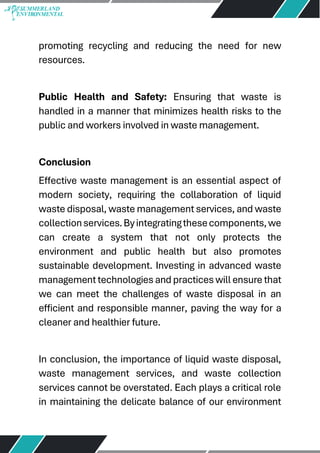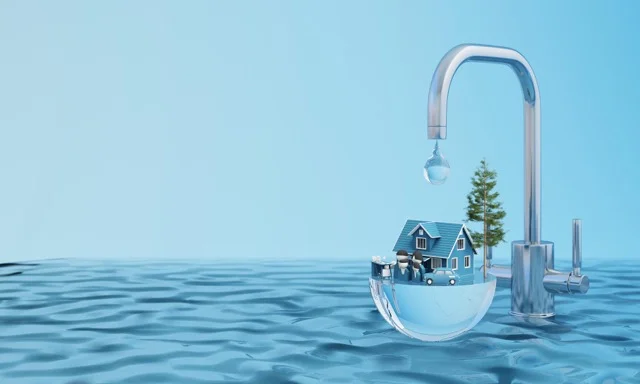How Reclaim Waste can Save You Time, Stress, and Money.
How Reclaim Waste can Save You Time, Stress, and Money.
Blog Article
Reclaim Waste Can Be Fun For Everyone
Table of ContentsThe Best Guide To Reclaim WasteThe Reclaim Waste StatementsThe Greatest Guide To Reclaim WasteFascination About Reclaim WasteNot known Factual Statements About Reclaim Waste
Check out the types, occurrences, and types of fluid waste. Domestic sewage waste describes the waste and items from a residential septic system. This kind of waste is created by people in residences, schools, and various other buildings. This only includes sewage-disposal tanks that have a drain area. The proper monitoring and disposal of domestic sewage waste require fluid waste to be transferred to a sewer therapy plant where the correct methods and equipment are put on purify and deal with waste.
Commercial waste frequently consists of prospective dangers, such as combustible materials or a mixture of liquid and strong waste products, and needs an advanced and comprehensive disposal procedure. The disposal of industrial waste typically entails the filtration of waste before transportation to make sure safe and correct disposal. Industrial waste is created from byproducts and runoff of commercial procedures and production.
This type of waste can not make use of the same sewer administration transport or processes as septic or business liquids. The industrial waste monitoring process calls for the examination and testing of fluid waste prior to it undergoes the disposal process (liquid waste disposal melbourne). Runoff waste is the fluid waste that originates from overflow and excess stormwater in extremely booming locations or cities
Overflow waste can create contamination and flooding if not managed appropriately. Ensuring proper waste monitoring can protect against catastrophes and decrease ecological injury.
The Facts About Reclaim Waste Revealed
Contact PROS Solutions today to find out about our waste monitoring and disposal services and the proper methods to take care of the fluid waste you create.
(https://issuu.com/reclaimwaste1)Do you understand what happens to your water when you end, flush the bathroom or drain the cleaning maker? No? Well, it's worth knowing. This supposed 'wastewater' is not just a vital source however, after therapy, will certainly be released to our land, rivers or the ocean. Used water from commodes, showers, baths, kitchen sinks, washings and commercial procedures is called wastewater.

water made use of to cool machinery or tidy plant and tools). Stormwater, a kind of wastewater, is drainage that flows from agricultural and urban locations such as roofing systems, parks, yards, roads, paths and seamless gutters right into stormwater drains pipes, after rainfall. Stormwater flows without treatment straight to local creeks or rivers, ultimately reaching the ocean.
What Does Reclaim Waste Do?
In Queensland, many wastewater is treated at sewage therapy plants. Wastewater is moved from domestic or industrial sites through a system of drains and pump stations, known as sewage reticulation, to a sewer treatment plant.
The Division of Natural Resources encourages neighborhood governments about managing, operating and preserving sewage systems and treatment plants. In unsewered areas, city governments might need householders to mount private or house sewage treatment systems to deal with residential wastewater from commodes, kitchens, washrooms and laundries. The Department of Natural Resources authorises using family systems when they are confirmed to be effective.
Most stormwater obtains no treatment. In some brand-new neighborhoods, therapy of some stormwater to get rid of clutter, sand and crushed rock has started making use of gross toxin catches. Wastewater therapy happens in 4 phases: Eliminates strong matter. Bigger solids, such as plastics and various other things incorrectly released to sewage systems, are removed when wastewater is gone through displays.
Wastewater then flows right into huge storage tanks where solids resolve and are gotten rid of as sludge. Oil and residue are skimmed from the surface area. Uses small living microorganisms recognizes as micro-organisms to damage down and eliminate staying dissolved wastes and great fragments. Micro-organisms and wastes are integrated in the sludge. Eliminates nitrogen and phosphorus nutrients that can create algal flowers in our waterways and intimidate water life.
What Does Reclaim Waste Mean?
Nutrient elimination is not readily available at all sewage therapy plants because it calls for expensive specialised tools. Clear fluid effluent generated after therapy may still contain disease-causing micro-organisms - industrial wastewater treatment.

This typically implies wastewater needs to be dealt with or contaminants gotten rid of prior to it can be discharged to waterways. Most this contact form wastewater moves into the sewerage system. Under the Act, city governments administer authorizations and licences for eco pertinent tasks (Ages) involving wastewater releases that could have a local effect. The division provides authorizations and permits to Periods entailing wastewater launches that could have a regional or statewide effect.
The 9-Minute Rule for Reclaim Waste
Or else, samples are taken for research laboratory analysis. Usually numerous examinations are required to establish the levels of each of the different toxins such as oils, hefty metals and pesticides in water. Surveillance provides factual info concerning water top quality and can confirm that licence conditions are being fulfilled. The details obtained with tracking provides the basis for making water top quality decisions.
Report this page